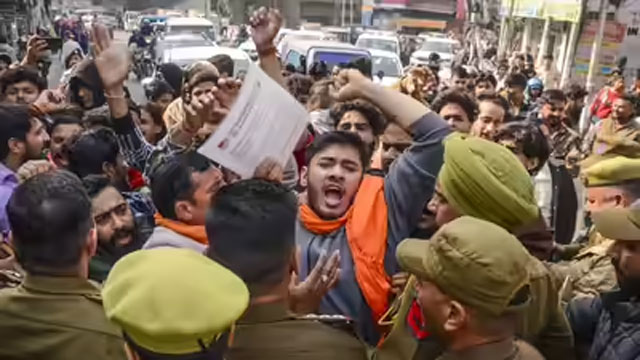Daijiworld Media Network – New Delhi
New Delhi, Nov 25: The newly inaugurated Shri Mata Vaishno Devi Institute of Medical Excellence in Jammu and Kashmir has found itself at the centre of a heated political controversy after 42 out of 50 students selected in the first MBBS batch were Muslims. The admission list, prepared strictly on NEET merit, has triggered protests from BJP, VHP and Bajrang Dal, while the J&K government has firmly defended the selections.
The row broke out soon after the medical college finalised admissions earlier this month. As per policy, 85% seats were allotted to J&K residents, with eight Hindu students from Jammu securing places in the inaugural batch. However, several right-wing organisations objected, arguing that an institute financed by the Mata Vaishno Devi Shrine Board must prioritise Hindu candidates.

Vishwa Hindu Parishad and Bajrang Dal claimed that a college funded by donations from Hindu devotees should “advance Hindu interests” and demanded that it be granted minority institution status. BJP leaders went a step further, insisting that only students with faith in Mata Vaishno Devi should be admitted.
“Donations to the shrine board come from Hindus, for the welfare of Hindus… This year’s admissions are not acceptable," BJP leader Sunil Sharma said after meeting J&K LG Manoj Sinha.
Officials, however, maintained that the college cannot legally apply religion-based preferences, as it does not hold minority status and must follow NEET merit guidelines.
Amid intensifying protests, J&K Chief Minister Omar Abdullah strongly countered the allegations, reiterating that the admissions were purely merit-driven.
“Some people do not like merit-based admissions. If you want admissions without merit, take permission from the Supreme Court,” he stated, adding that demands based on religious preference violate constitutional principles.
He further questioned the BJP’s stance:
“Our Constitution has the word ‘secular’. If you do not want to keep this country secular, remove that word.”
Responding to claims that the LG had assured a review of the admission list, Abdullah asked how such an assurance could even be made under law.
“Will you also say tomorrow that the hospital built with shrine donations will not treat Muslims and non-Hindus?” he remarked, calling the demand impractical and unconstitutional.
As the political standoff grows sharper, the controversy has ignited a broader debate on merit, secularism and the role of religious institutions in public-funded education — even as the college prepares to welcome its first batch of future doctors.